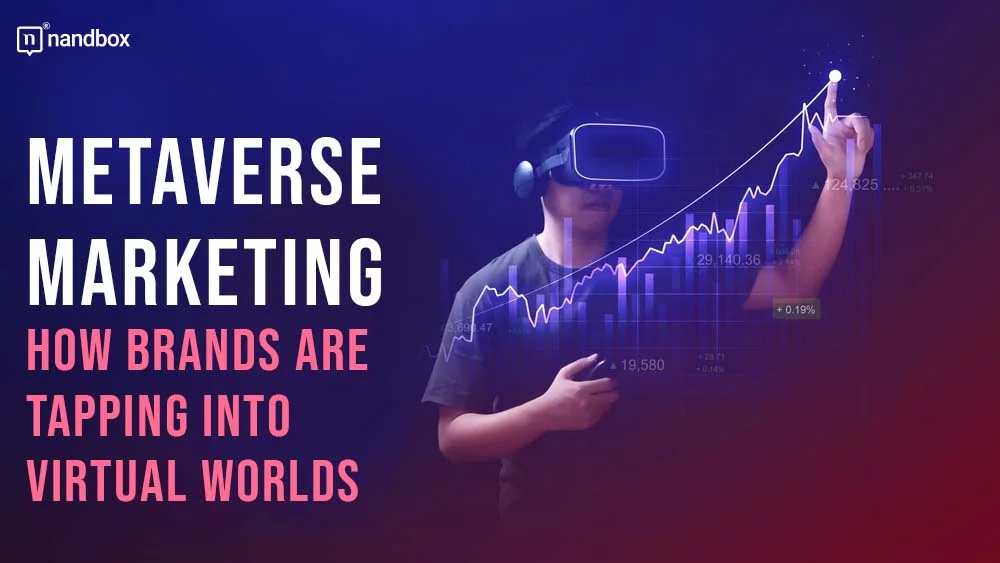In the ever-evolving digital marketing landscape, a new frontier has emerged that’s capturing the imagination of brands and consumers alike: the metaverse. This virtual realm, where the lines between physical and digital realities blur, opens up unprecedented opportunities for innovative metaverse marketing strategies. As companies seek to stay ahead of the curve, metaverse marketing quickly becomes a key focus for forward-thinking brands. In this comprehensive guide, we’ll explore how businesses navigate this exciting new terrain and what it means for the future of digital engagement.
Understanding the Metaverse Market
Before exploring metaverse marketing strategies, it’s crucial to grasp the market’s scope and potential. The metaverse refers to a collective virtual shared space created by converging virtually enhanced physical reality and physically persistent virtual reality. It’s a space where users can interact with a computer-generated environment and other users in real time.
The metaverse market is rapidly expanding, with projections suggesting it could reach a value of trillions of dollars in the coming years. Several factors drive this growth:
- Technological Advancements: Improvements in virtual and augmented reality technologies are making immersive experiences more accessible.
- Changing Consumer Behaviors: Younger generations, in particular, are increasingly comfortable with digital-first experiences.
- Investment from Tech Giants: Major technology companies are pouring billions into metaverse development.
- COVID-19 Acceleration: The pandemic has accelerated the adoption of virtual spaces for work, education, and socializing.
- NFTs and Digital Ownership: The rise of non-fungible tokens (NFTs) has created new possibilities for digital asset ownership and trading within virtual worlds.
As the metaverse market expands, it’s creating a wealth of opportunities for innovative marketing approaches.
The Rise of Metaverse Marketing
Metaverse marketing represents a paradigm shift in how brands interact with consumers. It goes beyond traditional digital marketing by offering immersive, interactive experiences that can forge deeper connections with audiences. Here’s why metaverse marketing is gaining traction:
- Engagement: The metaverse offers unparalleled levels of user engagement, allowing brands to create memorable, interactive experiences.
- Creativity: Virtual worlds provide a blank canvas for brand expression, free from physical world limitations.
- Data Insights: Metaverse platforms can offer rich data on user behavior and preferences, enabling highly targeted marketing.
- New Revenue Streams: Virtual goods and experiences open up new avenues for monetization.
- Global Reach: The metaverse transcends geographical boundaries, allowing brands to reach global audiences seamlessly.
- Brand Loyalty: Immersive experiences can foster stronger emotional connections and brand loyalty among consumers.
As these benefits become increasingly apparent, more brands are exploring how to incorporate metaverse marketing into their overall strategies.
Strategies for Marketing in the Metaverse
Successful metaverse marketing requires a shift in thinking from traditional marketing approaches. Here are some key strategies brands are employing:
- Virtual Events and Experiences Brands are creating immersive events, from product launches to virtual concerts, that allow users to engage with their products or services in novel ways.
- Virtual Real Estate and Branded Spaces Companies are establishing a presence in virtual worlds by purchasing digital land and creating branded spaces where users can interact with their brands.
- Virtual Influencers and Avatars Some brands are creating virtual influencers or brand unique avatars to represent them in the metaverse, allowing for more personalized interactions with users.
- Gamification and Rewards Incorporating game-like elements into marketing campaigns can encourage engagement and create a sense of achievement for users.
- Virtual Product Launches and Try-Ons The metaverse allows for virtual product demonstrations and try-ons, particularly useful for fashion and beauty brands.
- NFT Collectibles and Digital Merchandise Brands are creating limited-edition digital collectibles and merchandise, leveraging the scarcity and uniqueness of NFTs.
- Immersive Storytelling The metaverse offers new ways to tell brand stories, allowing for interactive narratives that users can be a part of.
- Virtual Collaborations and Co-Creation Brands can collaborate with users or other brands in the metaverse to co-create products or experiences.
These strategies showcase the versatility of metaverse marketing and its potential to create deeply engaging brand experiences.
Challenges in Metaverse Marketing
While the opportunities in metaverse marketing are vast, there are also significant challenges that brands need to navigate:
- Technological Barriers: Not all consumers have access to the hardware or internet speeds required for full metaverse experiences.
- Privacy Concerns: The immersive nature of the metaverse raises new questions about data collection and user privacy.
- Brand Safety: Ensuring brand safety in user-generated virtual worlds can be challenging.
- Measurement and ROI: Determining the effectiveness and return on investment for metaverse marketing initiatives is still evolving.
- Fragmentation: The metaverse landscape is currently fragmented, with multiple platforms and no standardized approach.
- Skill Gap: Many marketing teams lack the specialized skills required for creating effective metaverse experiences.
- Regulatory Uncertainty: The legal and regulatory landscape for metaverse activities is still developing.
Addressing these challenges will be crucial for the long-term success of metaverse marketing initiatives.
Best Practices for Digital Marketing in the Metaverse
To navigate the complexities of the metaverse and maximize the potential of their marketing efforts, brands should consider the following best practices:
- Authenticity is Key: Ensure that your metaverse presence aligns with your brand values and offers genuine value to users.
- Focus on Experience: Prioritize creating engaging, interactive experiences over traditional advertising approaches.
- Collaborate with Creators: Partner with metaverse creators and influencers who understand the platform and its community.
- Respect User Privacy: Be transparent about data collection and use, and prioritize user privacy and consent.
- Embrace Experimentation: The metaverse is a new frontier – be willing to try new approaches and learn from both successes and failures.
- Integration with Overall Strategy: Ensure that your metaverse marketing efforts are integrated with your broader marketing strategy.
- Accessibility: Consider how to make your metaverse experiences accessible to a wide range of users, including those with disabilities.
- Long-Term Thinking: View metaverse marketing as a long-term investment rather than a short-term tactic.
By following these best practices, brands can create more effective and responsible metaverse marketing campaigns.
Case Studies: Successful Metaverse Marketing Campaigns
While we won’t mention specific brand names, examining some successful metaverse marketing campaigns can provide valuable insights:
- A major sportswear company created a virtual world where users could participate in fitness challenges, try on virtual clothing, and interact with athlete avatars.
- A luxury fashion brand launched a collection of digital-only clothing items, which users could purchase as NFTs and wear on various metaverse platforms.
- A popular fast-food chain opened a virtual restaurant where users could place orders for both virtual and real-world food delivery.
- An automotive manufacturer created a virtual showroom where users could explore and customize vehicles in an immersive 3D environment.
- A global beverage company hosted a series of virtual concerts featuring popular artists, creating branded virtual venues and exclusive digital merchandise.
These examples demonstrate the diverse ways in which brands are leveraging the metaverse to create unique marketing experiences.
The Future of Metaverse Marketing
As technology continues to evolve and the metaverse becomes more integrated into daily life, we can expect metaverse marketing to undergo significant transformations:
- Hyper-Personalization: Advanced AI and data analytics will enable highly personalized marketing experiences tailored to individual user preferences and behaviors.
- Cross-Platform Integration: As the metaverse becomes more interconnected, marketing campaigns will seamlessly span multiple virtual worlds and platforms.
- Virtual Commerce: The line between marketing and e-commerce will blur, with more seamless integration of shopping experiences within virtual environments.
- AI-Driven Interactions: AI-powered virtual brand representatives will become more sophisticated, offering personalized assistance and engagement.
- Haptic Marketing: As haptic technology advances, brands may be able to incorporate touch and feel into their virtual marketing experiences.
- Blockchain and Decentralization: Decentralized metaverse platforms may change how brands approach marketing and user engagement.
- Regulatory Frameworks: The development of clearer regulatory guidelines for metaverse marketing will shape future strategies.
These trends suggest that metaverse marketing will continue to evolve, offering new opportunities for brands to connect with consumers in innovative ways.
Conclusion: Embracing the Metaverse Marketing Revolution
Metaverse marketing represents a significant shift in how brands engage with consumers, offering unprecedented opportunities for immersive, interactive experiences. As the metaverse continues to evolve, it’s clear that it will play an increasingly important role in the future of digital marketing.
For brands looking to stay ahead of the curve, now is the time to start exploring the possibilities of metaverse marketing. While challenges exist, the potential rewards in terms of engagement, brand loyalty, and new revenue streams are substantial.
Success in this new frontier will require a willingness to experiment, a focus on creating user value, and a long-term perspective. By embracing the unique characteristics of the metaverse and developing strategies that leverage its strengths, brands can position themselves at the forefront of this exciting new marketing landscape.
One thing is clear as we look to the future: the metaverse is not just a passing trend. It is a fundamental shift in how we interact with digital spaces. For marketers willing to embrace this change, the metaverse offers a world of possibilities limited only by imagination and creativity.





